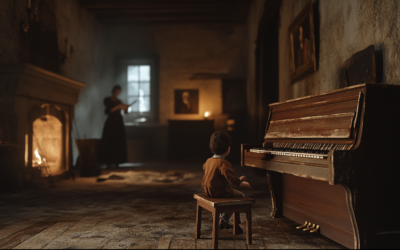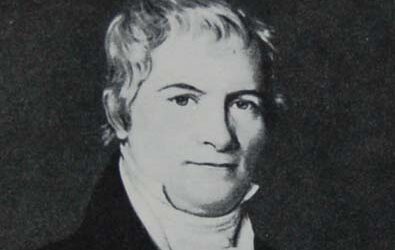The Influence of Ligniville
Unpacking Mozart's Early Education
The story of Ligniville illustrates the pitfalls of romanticizing Mozart’s early life and education, reminding us that the narrative of genius is often a construct that obscures the laborious aspects of musical development.
Mozart: The Fall of the Gods
This book offers a fresh and critical look at the life of Wolfgang Amadeus Mozart, challenging the myths that have surrounded him for centuries. We strip away the romanticised image of the “natural genius” and delve into the contradictions within Mozart’s extensive biographies. Backed by nearly 2,000 meticulously sourced citations, this work invites readers to explore a deeper, more complex understanding of Mozart. Perfect for those who wish to question the traditional narrative, this biography is a must-read for serious music lovers and historians.
"Don’t put strange ideas in her head. She plays like grass grows; it’s her nature: she is not a prodigy."
Mozart: The Fall of the Gods
“Don’t put strange ideas in her head. She plays like grass grows; it’s her nature: she is not a prodigy. If she hears these words, she will get an inflated sense of self, imagining some magnificent future, whereas it will always be work and more work.” This quote encapsulates the skepticism surrounding the notion of child prodigies in the context of musical education, particularly when we examine Wolfgang Amadeus Mozart’s formative years.
The idea that Mozart was a genius who mastered the intricacies of composition at an early age has been championed by figures like Abert, who suggested that Wolfgang learned the rules of writing from Maestro Martini. However, recent musicological research has dismantled this theory, revealing the complex truth about Mozart’s early education and the roles of those who influenced him, including the Marquis de Ligniville.
Leopold Mozart, Wolfgang’s father, regarded Ligniville as “the best contrapuntist in all of Italy.” Ligniville, a member of the prestigious Accademia Filarmonica in Bologna, was thought to represent the old Roman school of counterpoint. It was under his influence that Mozart supposedly composed significant works, including the Stabat Mater K.Anh.17 and the Kyrie K.89. For decades, these attributions went unchallenged, reinforcing the myth of a young Mozart capable of complex contrapuntal writing.
Yet, as modern scholars now assert, many of these pieces were actually copied by Mozart, leading to a reevaluation of his abilities as a contrapuntist. The lingering perception that Mozart excelled in counterpoint persists in numerous academic texts, despite the lack of substantiated evidence. It is striking how musicology, which should shun dogma, continues to propagate such myths, comparing Mozart’s work to that of other composers like Haydn and Rossini.
In particular, the Stabat Mater has garnered attention for its apparent mastery of canonic writing. Contemporary biographers marveled at a young boy’s ability to control compositions reminiscent of late 16th-century styles. However, we now recognize that the piece was heavily influenced by Ligniville’s work, with only a fraction of the movements authentically attributed to Mozart. Indeed, it has been established that Wolfgang copied Ligniville’s Stabat Mater, which itself consisted of straightforward canons, devoid of the sophisticated depth characteristic of true counterpoint.
Notably, Ligniville’s reputation as a composer was not grounded in his ability to write intricate fugues. His music—often simple and lacking the rigor required for upper-level composition courses—failed to impress contemporaries, including Grand Duke Pietro Leopoldo, who noted the work as “singulier” rather than “excellent.” This implies that while Ligniville may have held some esteem, he did not possess the skills that would warrant the title of the greatest contrapuntist in Italy.
Leopold’s enthusiasm for Ligniville’s abilities raises questions about his own understanding of counterpoint, revealing that he may have misjudged the Marquis’s capabilities. While Ligniville did have some influence on Mozart, it appears to have been limited and heavily reliant on copying rather than original composition. This oversight contributes to the enduring misconception of Mozart’s innate genius, overshadowed by the more mundane realities of musical training and imitation.
Ultimately, the story of Ligniville illustrates the pitfalls of romanticizing Mozart’s early life and education. It serves as a reminder that the narrative of genius is often a construct, one that can obscure the more laborious and collaborative aspects of musical development.
As we continue to explore the complexities of Mozart’s influences, it becomes increasingly clear that his path was marked by learning, imitation, and the guidance of those who came before him, rather than a straightforward ascent to greatness.
You May Also Like
The Myth of Mozart’s Childhood
Mozart’s childhood is often romanticised, but behind the myth lies a more complex reality. This post explores the hidden dynamics within his family, questioning the traditional narrative of Mozart's early years and shedding light on the forgotten role of his sister,...
Bohemia or Moravia: Reconfiguring Music History
Why does music history insist on an Austrian narrative, when the contributions of other nations are just as crucial?
The True Caregiver: A Closer Look at Mozart’s Final Days
Who truly cared for Mozart in his final days: his wife Constanze or his sister-in-law Sophie? The True Caregiver unravels this age-old mystery, challenging our perceptions and shedding light on the figures closest to the composer in his last hours.
The Mysterious Origins of Mozart’s K.115
The story of Mozart’s Mass K.115 is one of myth and mistaken identity, pointing not to Wolfgang’s genius but rather to his father Leopold’s hidden influence.
Unveiling the Truth: Mozart in Paris
Unveiling the often-overlooked reality of Mozart’s time in Paris reveals a story of manipulation and deception, far removed from the glorified narratives crafted by his father, Leopold.
The Questionable Legacy of Niemetschek’s Biography
Leopold Mozart’s life was a whirlwind of ambition, deceit, and disappointment—a stark portrait of a man chasing success at any cost.







